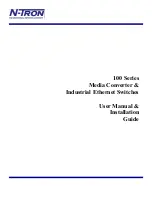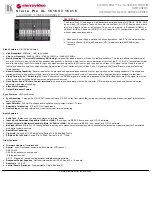
9
CHAPTER 3: Hardware Installation
3.6 What to Do Next
You have now finished your Multiport Spooler VIII’s hardware setup. Before
you go on to
Section 3.7
, read the passages under the following three
headings. Your answers will determine whether or not you need to install
any of the software used to control the MPS-VIII.
3.6.1 D
O
Y
OU
N
EED TO
C
ONFIGURE THE
MPS-VIII?
Depending on your specific needs, you might or might not have to configure
the Multiport Spooler VIII. Once you have connected your peripherals as
described in the Easy Installation Guide, the MPS-VIII is ready to operate
using its default configuration:
• By default, ports 4, 8, and 12 are output ports; the others are input ports
(if parallel) or bidirectional (if serial).
• The default communication parameters of the MPS-VIII’s serial ports are:
9600 bps, 8 data bits, 1 stop bit, no parity, and hardware handshaking
(DTR/CTS).
If these settings suit your needs, no further configuration is needed. If they
don’t, you need to use the configuration program to adapt the Multiport
Spooler VIII to meet your requirements (see
Chapter 4
).
Basically, you need to configure the Multiport Spooler VIII if:
• You have to change an input port to an output port, or vice versa.
• The communication parameters of the MPS-VIII’s serial ports do not
match those of the attached PCs and peripherals.
NOTE
You can also use the configuration program to change various user-
specific functions. Refer to
Section 4.7
for a full list of the parameters set
with the program and their default settings.
Summary of Contents for PI750A
Page 119: ...111 APPENDIX A Cable Pinouts IBM AT to MPS VIII DB9M to DB25M...
Page 173: ...NOTES...
















































